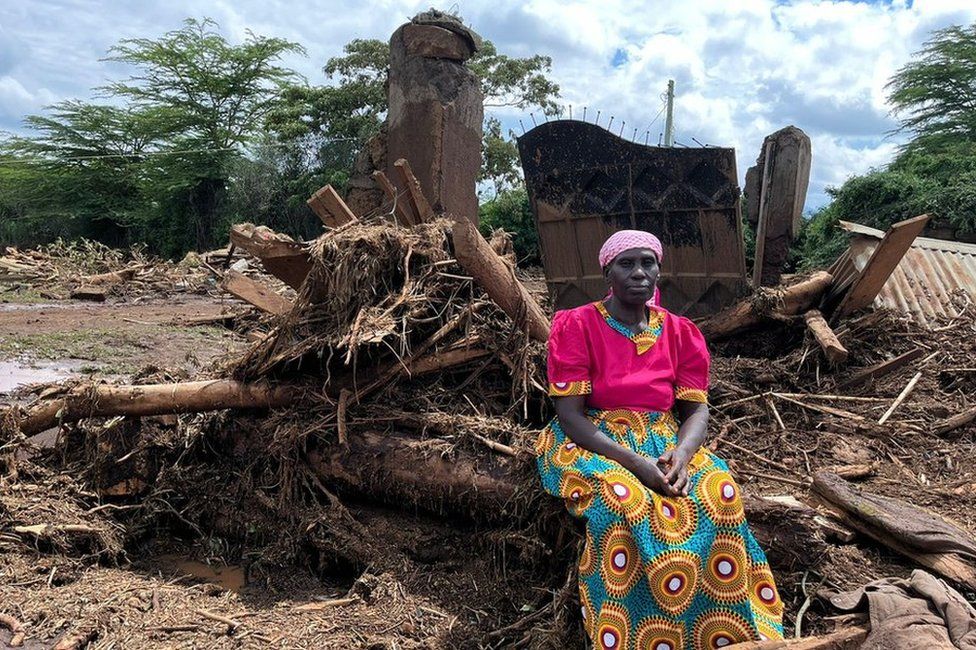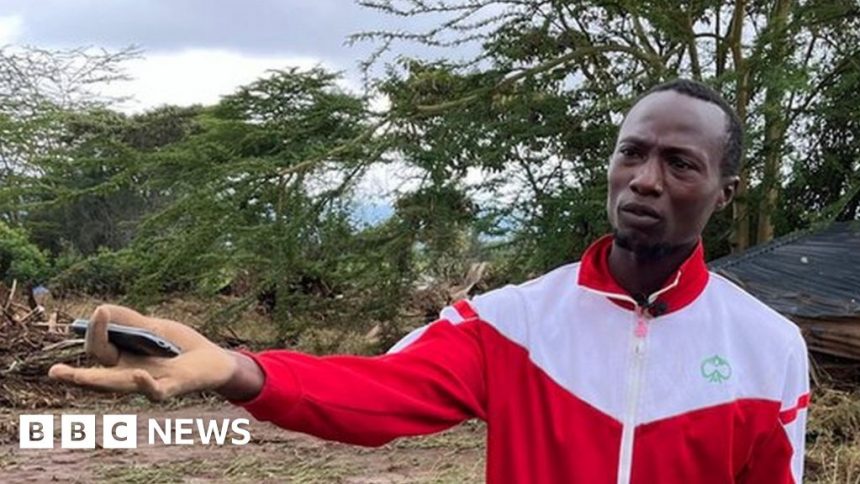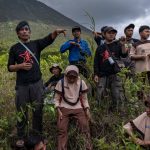Kenya floods: Survivors seek loved ones as evacuation ordered
-
Published

Kenyans living in areas at risk of flooding or landslides will be asked to evacuate on Wednesday, the country’s president has said.
William Ruto was speaking in Mai Mahiu, north of Nairobi, where an overflowing reservoir has wiped out a swathe of houses and swept dozens of people to their death.
This is “not a time for guesswork” he said, noting the forecast for more heavy rain.
“The likelihood of flooding and people losing [their] lives is real”, he added.
Although no definitive number was given, an evacuation order of this scale will likely target many thousands of people.
The rainy season has been extra punishing this year, and weeks of flooding have killed at least 170 people.
But the disaster at Mai Mahiu has been the most catastrophic so far.
The reality is still sinking in for those who had hoped their missing loved ones had survived.
“My brother was in his 70s when he died after being washed away,” 62-year-old Nancy Wanjiku told the BBC.
She spoke to us sitting on the wreckage of what was once her parents’ home.
“My mum and dad are safe but we have lost everything,” she added.
Elsewhere, we saw a woman on the side of the road bent over double crying, losing herself in the news that the body of her child had been found.
Rescue workers continued the search for more of the dead.
We followed them down along the blasted banks of the Ngeya River – mostly members of the National Youth Services in bright yellow vests carrying shovels, rakes and sticks to poke through the branches of uprooted trees.
Some stopped at an enormous heap of broken branches that covered a crushed house. A family of six had lived there and the workers suspected they might be buried under the mound.
They called in a bulldozer to clear out the debris, but it did not find evidence of a watery death.
Not far from here we met Stephen Kamau, 31, helping a neighbour to sift through what is left of their home.
“I’m trying to salvage things that were carried away by water and look for missing people as well,” he explained.
“I woke up in a different world. Everything had been swept by water…. We are in fear. My heart is heavy.”
Further downstream, a rescue team found the body of a woman tucked away in logs at the top of a bridge. Onlookers recognised her as someone who had worked at a local 24-hour car wash.
Another woman, who did not identify herself, trekked to the site to see if her three missing sisters had washed up there.
Her brother had searched for them in a nearby hospital, but came back empty-handed, she said.
She had stayed awake all night, worried that another tide of water would crash down on her while she was sleeping.
The terror of that flash-flood on Sunday night – triggered when water built up in a gully because a tunnel was blocked – is still vivid.
David Karanja has just returned from the morgue to view the body of his 9-year-old son Paul.
He stands with his eyes downcast and his arm in a sling, next to corrugated-iron roof panels lurching over the shell of his still-standing home, while he and his 17-year-old daughter Veronica told their story.
Like others that lived in the river valley, they were awakened by the roar of water at 03:00 local time (00:00 GMT) on Monday.
They rushed to switch off the power to avoid electric shock, but when David opened the door, Veronica was swept away. She says she clung to a tree branch until the water subsided.
When she made it back to the house, she couldn’t find her father right away – until she heard people calling her name.
“He was hit by a stone,” she told the BBC. “When he was trying to rescue my brother, a stone from the upper side of the wall hit his hand, and he let [Paul] go, and that’s why [Paul] drowned.”
The family lived off their livestock – all gone now. Their 900 hens perished. And of 21 pigs, only five are left. “We have totally nothing right now,” Veronica said.
They are appealing for help, and President Ruto promised government support when he stopped at a local school sheltering survivors.
Those gathered were told they would get help rebuilding their houses, but not next to the river if experts deemed it possible they could once again be in the pathway of such destruction.
Mr Ruto said the authorities had mapped all fragile places in the country prone to floods and landslides, and that the army had been mobilised to help the evacuations.
He did not say where they would go, nor exactly from where the resources would come, although he mentioned working with development partners.
But the plan reflects his view that Kenya – and the region of East Africa – is vulnerable to extreme weather caused by climate change, and suggests he that sees this disastrous rainy season as part of a long-term problem.
More about the floods in East Africa:
Floods wreak havoc in Kenya, Tanzania and Burundi







